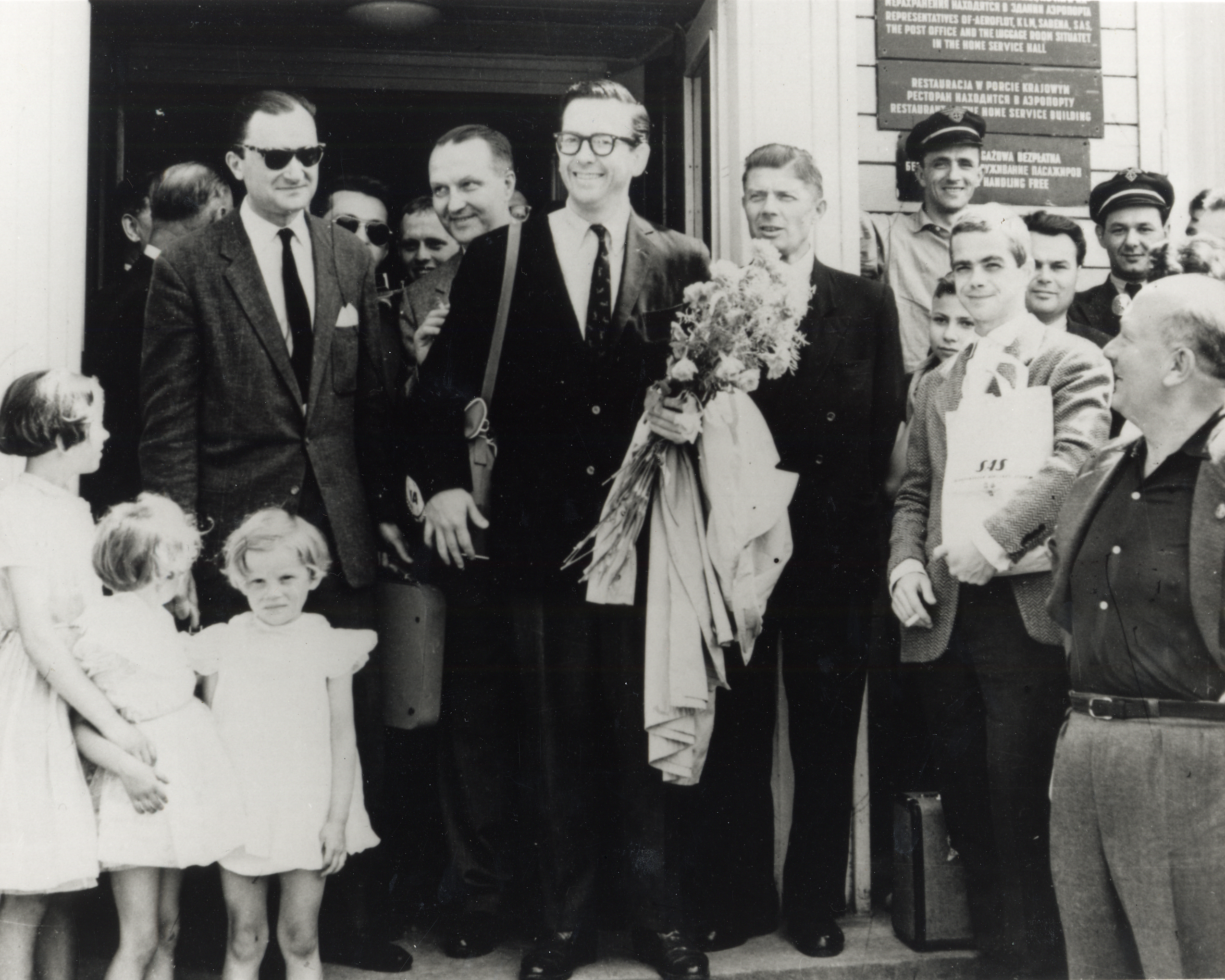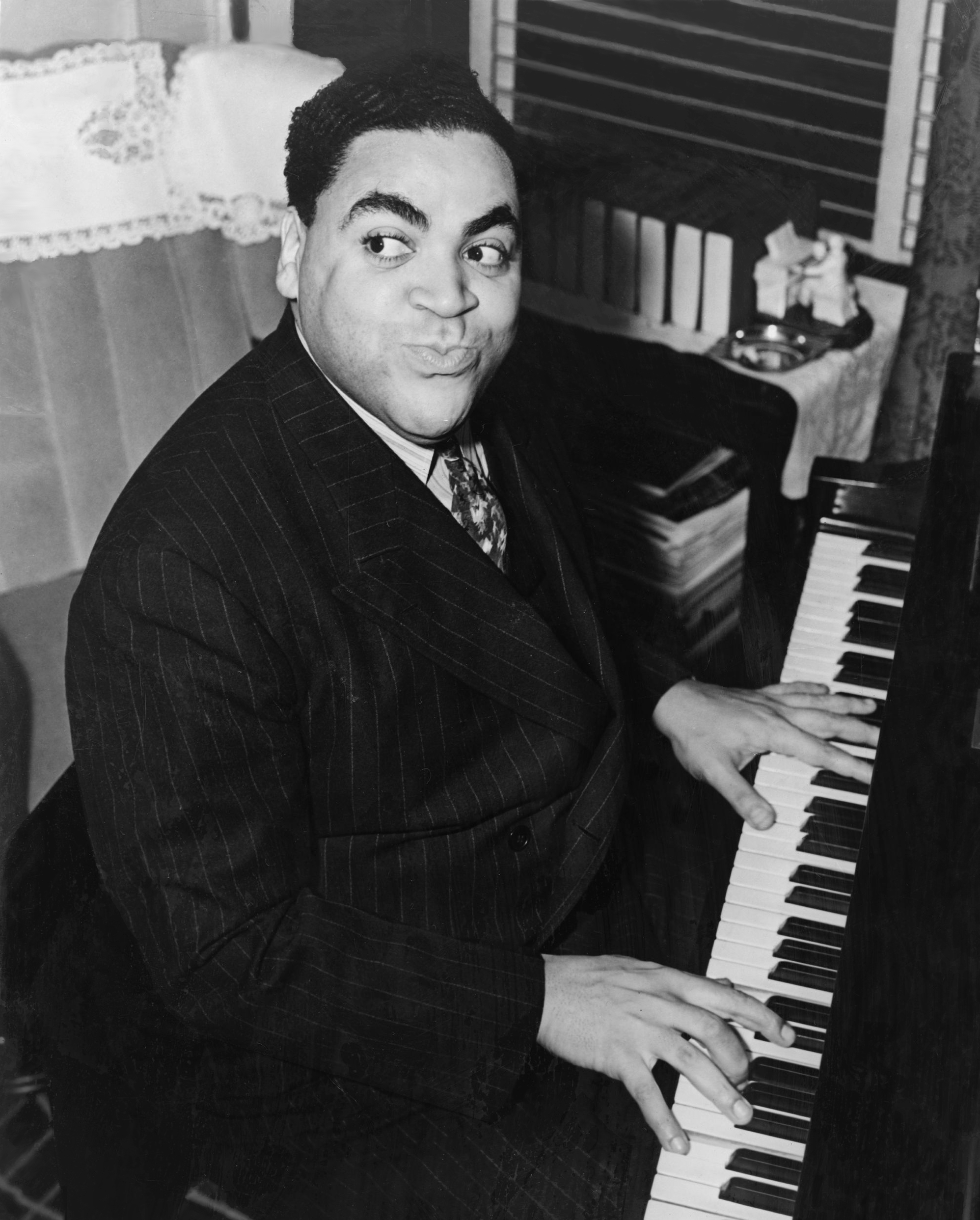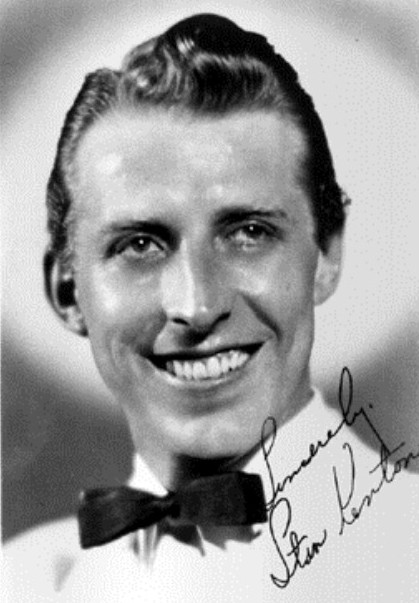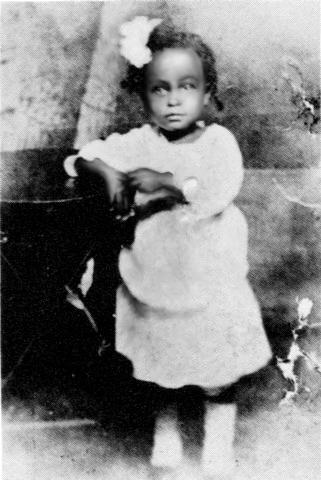|
Willis Conover
Willis Clark Conover, Jr. (December 18, 1920 – May 17, 1996) was a jazz producer and broadcaster on the Voice of America for over forty years. He produced jazz concerts at the White House, the Newport Jazz Festival, and for movies and television. By arranging concerts where people of all races were welcome, he is credited with desegregating Washington, D.C., nightclubs.Robert McG. Thomas Jr."Willis Conover Is Dead at 75; Aimed Jazz at the Soviet Bloc", ''New York Times'', May 19, 1996. Retrieved February 4, 2010. Conover is credited with keeping interest in jazz alive in the countries of Eastern Europe through his nightly broadcasts during the Cold War. Youth As a young man, Conover was interested in science fiction, and published a science-fiction fanzine, ''Science Fantasy Correspondent''. This brought him into contact with horror writer H. P. Lovecraft. The correspondence between Lovecraft, who was at the end of his life, and the young Conover, has been published as ''L ... [...More Info...] [...Related Items...] OR: [Wikipedia] [Google] [Baidu] |
Buffalo, New York
Buffalo is the second-largest city in the U.S. state of New York (behind only New York City) and the seat of Erie County. It is at the eastern end of Lake Erie, at the head of the Niagara River, and is across the Canadian border from Southern Ontario. With a population of 278,349 according to the 2020 census, Buffalo is the 78th-largest city in the United States. The city and nearby Niagara Falls together make up the two-county Buffalo–Niagara Falls Metropolitan Statistical Area (MSA), which had an estimated population of 1.1 million in 2020, making it the 49th largest MSA in the United States. Buffalo is in Western New York, which is the largest population and economic center between Boston and Cleveland. Before the 17th century, the region was inhabited by nomadic Paleo-Indians who were succeeded by the Neutral, Erie, and Iroquois nations. In the early 17th century, the French began to explore the region. In the 18th century, Iroquois land surrounding Buffa ... [...More Info...] [...Related Items...] OR: [Wikipedia] [Google] [Baidu] |
Conover
Conover may refer to: People * Conover (surname) Places in the United States * Conover, Iowa, a ghost town * Conover, North Carolina, a city * Conover, Ohio, an unincorporated community * Conover, Wisconsin Conover is a town in Vilas County, Wisconsin, United States. The population was 1,235 at the 2010 census. The unincorporated community of Conover is located in the town. History The town is named after Seth H. Conover, a descendant of Wolphe ..., a town * Conover (community), Wisconsin, an unincorporated community {{disambiguation, geo ... [...More Info...] [...Related Items...] OR: [Wikipedia] [Google] [Baidu] |
Central Europe Review
Central is an adjective usually referring to being in the center of some place or (mathematical) object. Central may also refer to: Directions and generalised locations * Central Africa, a region in the centre of Africa continent, also known as Middle Africa * Central America, a region in the centre of America continent * Central Asia, a region in the centre of Eurasian continent * Central Australia, a region of the Australian continent * Central Belt, an area in the centre of Scotland * Central Europe, a region of the European continent * Central London, the centre of London * Central Region (other) * Central United States, a region of the United States of America Specific locations Countries * Central African Republic, a country in Africa States and provinces * Blue Nile (state) or Central, a state in Sudan * Central Department, Paraguay * Central Province (Kenya) * Central Province (Papua New Guinea) * Central Province (Solomon Islands) * Central Province, Sri ... [...More Info...] [...Related Items...] OR: [Wikipedia] [Google] [Baidu] |
National Recording Registry
The National Recording Registry is a list of sound recordings that "are culturally, historically, or aesthetically significant, and/or inform or reflect life in the United States." The registry was established by the National Recording Preservation Act of 2000, which created the National Recording Preservation Board, whose members are appointed by the Librarian of Congress. The recordings preserved in the United States National Recording Registry form a registry of recordings selected yearly by the National Recording Preservation Board for preservation in the Library of Congress. The National Recording Preservation Act of 2000 established a national program to guard America's sound recording heritage. The Act created the National Recording Registry, The National Recording Preservation Board and a fund-raising foundation. The purpose of the Registry is to maintain and preserve sound recordings and collections of sound recordings that are culturally, historically, or aesthetically ... [...More Info...] [...Related Items...] OR: [Wikipedia] [Google] [Baidu] |
Library Of Congress
The Library of Congress (LOC) is the research library that officially serves the United States Congress and is the ''de facto'' national library of the United States. It is the oldest federal cultural institution in the country. The library is housed in three buildings on Capitol Hill in Washington, D.C.; it also maintains a conservation center in Culpeper, Virginia. The library's functions are overseen by the Librarian of Congress, and its buildings are maintained by the Architect of the Capitol. The Library of Congress is one of the largest libraries in the world. Its "collections are universal, not limited by subject, format, or national boundary, and include research materials from all parts of the world and in more than 470 languages." Congress moved to Washington, D.C., in 1800 after holding sessions for eleven years in the temporary national capitals in New York City and Philadelphia. In both cities, members of the U.S. Congress had access to the sizable colle ... [...More Info...] [...Related Items...] OR: [Wikipedia] [Google] [Baidu] |
Art Tatum
Arthur Tatum Jr. (, October 13, 1909 – November 5, 1956) was an American jazz pianist who is widely regarded as one of the greatest in his field. From early in his career, Tatum's technical ability was regarded by fellow musicians as extraordinary. Many pianists attempted to copy him; others questioned their own skills after encountering him, and some even switched instruments in response. In addition to being acclaimed for his virtuoso technique, Tatum extended the vocabulary and boundaries of jazz piano far beyond his initial stride influences, and established new ground in jazz through innovative use of reharmonization, voicing, and bitonality. Tatum grew up in Toledo, Ohio, where he began playing piano professionally and had his own radio program, rebroadcast nationwide, while still in his teens. He left Toledo in 1932 and had residencies as a solo pianist at clubs in major urban centers including New York, Chicago, and Los Angeles. In that decade, he settled into a pa ... [...More Info...] [...Related Items...] OR: [Wikipedia] [Google] [Baidu] |
Benny Goodman
Benjamin David Goodman (May 30, 1909 – June 13, 1986) was an American clarinetist and bandleader known as the "King of Swing". From 1936 until the mid-1940s, Goodman led one of the most popular swing big bands in the United States. His concert at Carnegie Hall in New York City on January 16, 1938, is described by critic Bruce Eder as "the single most important jazz or popular music concert in history: jazz's 'coming out' party to the world of 'respectable' music." Goodman's bands started the careers of many jazz musicians. During an era of racial segregation, he led one of the first integrated jazz groups, his quartet and quintet. He performed nearly to the end of his life while exploring an interest in classical music. Early years Goodman was the ninth of twelve children born to poor Jewish emigrants from the Russian Empire. His father, David Goodman (1873–1926), came to the United States in 1892 from Warsaw in partitioned Poland and became a tailor. His mother, Dor ... [...More Info...] [...Related Items...] OR: [Wikipedia] [Google] [Baidu] |
Stan Kenton
Stanley Newcomb Kenton (December 15, 1911 – August 25, 1979) was an American popular music and jazz artist. As a pianist, composer, arranger and band leader, he led an innovative and influential jazz orchestra for almost four decades. Though Kenton had several pop hits from the early 1940s into the 1960s, his music was always forward-looking. Kenton was also a pioneer in the field of jazz education, creating the Stan Kenton Band Clinics, Stan Kenton Jazz Camp in 1959 at Indiana University.Sparke, Michael. ''Stan Kenton: This is an Orchestra.'' UNT Press (2010). . Early life Stan Kenton was born on December 15, 1911, in Wichita, Kansas; he had two sisters (Beulah and Erma Mae) born three and eight years after him. His parents, Floyd and Stella Kenton, moved the family to Colorado, and in 1924, to the Greater Los Angeles Area, settling in suburban Bell, California. Kenton attended Bell High School (Bell, California), Bell High School; his high-school yearbook picture has the prop ... [...More Info...] [...Related Items...] OR: [Wikipedia] [Google] [Baidu] |
Peggy Lee
Norma Deloris Egstrom (May 26, 1920 – January 21, 2002), known professionally as Peggy Lee, was an American jazz and popular music singer, songwriter, composer, and actress, over a career spanning seven decades. From her beginning as a vocalist on local radio to singing with Benny Goodman's big band, Lee created a sophisticated persona, writing music for films, acting, and recording conceptual record albums combining poetry and music. Called the "Queen of American pop music," Lee recorded over 1,100 masters and composed over 270 songs. Early life Lee was born Norma Deloris Egstrom in Jamestown, North Dakota, United States, on May 26, 1920, the seventh of the eight children of Selma Emele (née Anderson) Egstrom and Marvin Olaf Egstrom, a station agent for the Midland Continental Railroad. Her family were Lutherans. Her father was Swedish-American and her mother was Norwegian-American. After her mother died when Lee was four, her father married Minnie Schaumberg Wiese. Lee an ... [...More Info...] [...Related Items...] OR: [Wikipedia] [Google] [Baidu] |
Stan Getz
Stanley Getz (February 2, 1927 – June 6, 1991) was an American jazz saxophonist. Playing primarily the tenor saxophone, Getz was known as "The Sound" because of his warm, lyrical tone, with his prime influence being the wispy, mellow timbre of his idol, Lester Young. Coming to prominence in the late 1940s with Woody Herman's big band, Getz is described by critic Scott Yanow as "one of the all-time great tenor saxophonists". Getz performed in bebop and cool jazz groups. Influenced by João Gilberto and Antônio Carlos Jobim, he also helped popularize bossa nova in the United States with the hit 1964 single "The Girl from Ipanema". Early life Stan Getz was born on February 2, 1927, at St. Vincent's Hospital in Philadelphia, Pennsylvania, United States. Getz's father Alexander ("Al") was a Ukrainian Jewish immigrant who was born in Mile End, London, in 1904, while his mother Goldie (née Yampolsky) was born in Philadelphia in 1907. His paternal grandparents Harris and Bec ... [...More Info...] [...Related Items...] OR: [Wikipedia] [Google] [Baidu] |
Billie Holiday
Billie Holiday (born Eleanora Fagan; April 7, 1915 – July 17, 1959) was an American jazz and swing music singer. Nicknamed "Lady Day" by her friend and music partner, Lester Young, Holiday had an innovative influence on jazz music and pop singing. Her vocal style, strongly inspired by jazz instrumentalists, pioneered a new way of manipulating phrasing and tempo. She was known for her vocal delivery and improvisational skills. After a turbulent childhood, Holiday began singing in nightclubs in Harlem, where she was heard by producer John Hammond, who liked her voice. She signed a recording contract with Brunswick in 1935. Collaborations with Teddy Wilson produced the hit "What a Little Moonlight Can Do", which became a jazz standard. Throughout the 1930s and 1940s, Holiday had mainstream success on labels such as Columbia and Decca. By the late 1940s, however, she was beset with legal troubles and drug abuse. After a short prison sentence, she performed at a sold-out c ... [...More Info...] [...Related Items...] OR: [Wikipedia] [Google] [Baidu] |
Soviet Union
The Soviet Union,. officially the Union of Soviet Socialist Republics. (USSR),. was a List of former transcontinental countries#Since 1700, transcontinental country that spanned much of Eurasia from 1922 to 1991. A flagship communist state, it was nominally a Federation, federal union of Republics of the Soviet Union, fifteen national republics; in practice, both Government of the Soviet Union, its government and Economy of the Soviet Union, its economy were highly Soviet-type economic planning, centralized until its final years. It was a one-party state governed by the Communist Party of the Soviet Union, with the city of Moscow serving as its capital as well as that of its largest and most populous republic: the Russian Soviet Federative Socialist Republic, Russian SFSR. Other major cities included Saint Petersburg, Leningrad (Russian SFSR), Kyiv, Kiev (Ukrainian Soviet Socialist Republic, Ukrainian SSR), Minsk (Byelorussian Soviet Socialist Republic, Byelorussian SSR), Tas ... [...More Info...] [...Related Items...] OR: [Wikipedia] [Google] [Baidu] |







